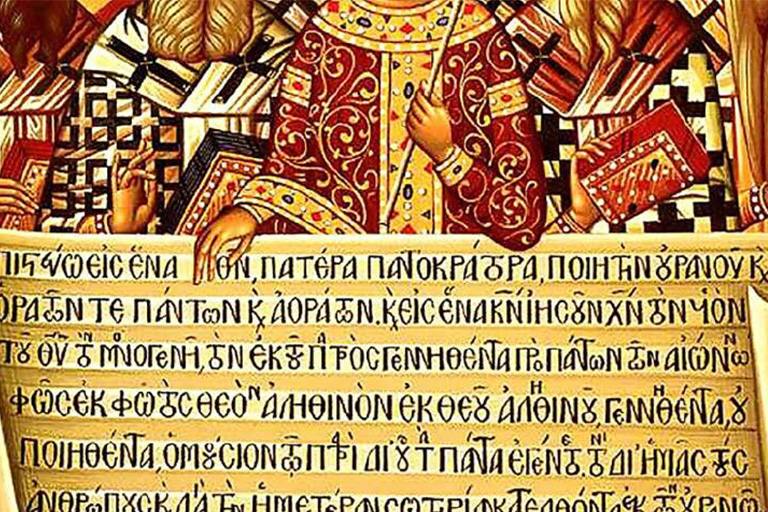Pontifical University of the Holy Cross, Rome, June 16 2025
In view of the exhibition to be held during the Rimini Meeting 2025, entitled “Light from Light. Nicaea 1700 years later”, organised by the Pontifical University of the Holy Cross and the PATRES Association, and starting from the book La scommessa di Costantino. Come il Concilio di Nicea ha cambiato la storia (Mondadori 2025), on 16 June 2025, the ROR organised an afternoon of dialogue, moderated by the director Ilaria Vigorelli, between Gian Guido Vecchi (Vatican correspondent for Corriere della Sera), Giovanni Maria Vian (professor of patristic philology at La Sapienza University), authors of the aforementioned volume, and Giulio Maspero (dean of the faculty of theology PUSC).
One never knows enough about Nicaea, and the book, the authors explained, is the result of a solid friendship but also a gamble: the challenge of helping the public understand the “turning point” that this moment in the history of dogma represented at a time of “crisis” for Christianity. Nicaea was a key moment for Christians in justifying their faith, but it was also a very significant turning point in human history. As Giulio Maspero recalled in this regard, Jean Daniélou, in his Prayer as a Political Problem, argued that Constantine’s “gamble” allowed Christianity to become a religion of the people, that is, it allowed “weak” Christians, ordinary people, and not only martyrs, to profess their faith, thus allowing Christianity to flourish. The authors illustrated the historical context immediately preceding the Council, focusing on Diocletian’s harsh and bloody persecution, which aimed to dismantle the structures of the Church and on the controversial and remarkable figure of Emperor Constantine, emphasising how the position he took cannot be simplistically defined as “a position of convenience”.
Conversing in the hall named after pope Benedict XVI reminded those present that it was Ratzinger himself who, in the 1990s, returned to speak of the Council of Nicaea to reaffirm its importance. Even today, the turning point consists in having affirmed faith in the dignity and lordship of Christ, God made man, coeternal with the Father.
The relevance of Nicaea lies not only in the fact that we still repeat the words defined 1700 years ago by the council fathers, but also in the recognition that contemporary faith is experiencing the drift of a“new Arianism”. Ratzinger defined this as the creeping trend of reducing Christ to a superman, which would empty Christianity of its essence and, as Gianguido Vecchi noted, leave us all at the mercy of nihilism: if Jesus were a superman, we would be overwhelmed by him, but instead he is our Saviour, he is God-with-us. For this reason, explained Giulio Maspero, the upcoming exhibition “Luce da luce” (Light from Light) will welcome visitors with a video by Bono, front man of U2, who implicitly strikes at the theses of the new Arianism by stating: «Jesus said he was God, so he is either crazy or he is right». The intention of the exhibition organisers is to bring a journey of experts on Nicaea into a popular context, where they can offer to a variety of people all the richness of the mystery of the Incarnate Word.
A recently discovered submerged basilica in Nicaea – likely part of a civil complex near an imperial palace – serves as a symbolic reference point. The design of the exhibition space seeks to evoke the architecture of a basilica. At its heart is a symbolic Light meant to leave a lasting impression on visitors, guiding them through a historical and spiritual journey. This journey, unfolding within a shared space, is intended to reach everyone – offering a path for all who seek to live as true believers within the Church.


